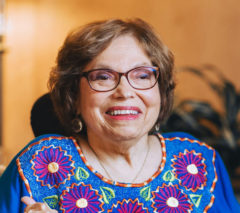
Judith Heumann
Disability Rights Activist
October 26, 2022 — 4:10 PMAlumni House, Toll Room, University of California, Berkeley — UC Berkeley Campus
In memoriam of Judith Heumann (1947-2023) Disability rights activist Judith “Judy” Heumann’s impact on the Berkeley campus can be seen widely, from the braille signage on restroom walls to the curb cuts and ramp accessible structures along pathways. Campus … Continued
Alumni House, Toll Room, University of California, Berkeley - UC Berkeley Campus Berkeley Graduate Lectures [email protected] false MM/DD/YYYY
In memoriam of Judith Heumann (1947-2023)
Disability rights activist Judith “Judy” Heumann’s impact on the Berkeley campus can be seen widely, from the braille signage on restroom walls to the curb cuts and ramp accessible structures along pathways. Campus resources like the Disabled Students’ Program and the newly opened Disability Cultural Community Center demonstrate the systemic changes Heumann inspired nearly 40 years after she graduated. Beyond the Berkeley campus, Heumann’s legacy can be experienced around the world in every building, classroom and institution that initially rejected people because of their disabilities. Heumann courageously fought for, and eventually won, access for them all. Read more about Judy’s legacy in the Berkeley News and The New York Times.
About Judith Heumann
Judy Heumann was a lifelong advocate for the rights of disabled people. She was instrumental in the development and implementation of legislation, such as Section 504, the Individuals with Education Act, the Americans with Disabilities Act, the Rehabilitation Act, and the UN Convention on the Rights of Persons with Disabilities. Her memoir, “Being Heumann: An Unrepentant Memoir of a Disability Rights Activist,” co-authored by Kristen Joiner, was published in 2020. She has also been featured in the Oscar-nominated documentary, Crip Camp: A Disability Revolution, directed by James LeBrecht and Nicole Newnham. Judy produced a podcast called The Heumann Perspective, which featured a variety of members from the disability community.
Judy served on a number of non-profit boards, including the American Association of People with Disabilities, the Disability Rights Education and Defense Fund, Humanity and Inclusion, and Human Rights Watch. She had 20 years of non-profit experience working with various disability organizations, including being a founding member of the Berkeley Center for Independent Living. Prior to starting the Judith Heumann LLC, she served in the Clinton and Obama administrations.
About Karen Tani
Karen M. Tani is the Seaman Family University Professor at the University of Pennsylvania, where she is jointly appointed in the law school and the history department. A scholar of U.S. legal history, she has broad interests in social welfare law, disability law, administrative agencies, and the role of rights in the modern American state. She is the author of States of Dependency: Welfare, Rights, and American Governance, 1935-1972 (Cambridge University Press, 2016). Other scholarship has appeared or is forthcoming in the Yale Law Journal, the Law & History Review, the California Law Review, and the Disability Studies Quarterly, among other outlets. She began her teaching career at UC Berkeley, where she also developed her interest in the history of disability law and the disability rights movement.
About the lecture
Disability rights activist Judy Heumann fought for inclusion for over six decades, in ways that transformed legal and societal understandings of equality. Her life-long experience has included co-founding the organization Disabled in Action, working on Capitol Hill to shape landmark disability rights laws, co-organizing the extraordinary protest and advocacy efforts that spurred the implementation of Section 504, and advising presidential administrations and the World Bank on disability issues. This lecture, delivered in a conversational format, will focus on those aspects of her journey that are most salient to the perils and possibilities of the present. Heumann sees in this moment a fragile and imperfect democracy, but one that is nonetheless worth investing in. She also saw deep structures of exclusion, vigorously defended but also vulnerable to political pressure and moral suasion. Discussion addressed why progress, while being meaningful, has still not been as significant as she believed it should be.